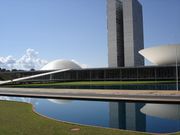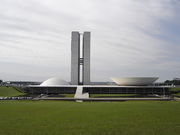National Congress of Brazil
| Brazil |
 This article is part of the series: |
|
|
|
Executive
Legislative
Judiciary
Elections
General
|
|
Other countries · Atlas |
The National Congress of Brazil (Portuguese: Congresso Nacional do Brasil) is the supreme legislative body of Brazil. Unlike regional legislative bodies - Legislative Assemblies and City Councils -, the Congress is bicameral, composed of the Federal Senate (the upper house) and the Chamber of Deputies (the lower house).
The Senate represents the 26 states and the Federal District, and its members are elected by a majority of the votes. The Chamber of Deputies represents the people of each state, and its members are elected by a proportional representation of votes. This is due to federalism being adopted as the form of government in the country. The Congress meets annually in its Brasília seat from 2 February to 27 July and from 1 August to 22 December. Until Constitutional Amendment number 50 of February 2006, this period was from 15 February to 30 June and from 1 August to 15 December (according to internal rules of the Chamber of Deputies).
Until recently, it was common for politicians to switch parties, and the proportion of congressional seats held by each party would often change. However, a decision of the Supremo Tribunal Federal has regulated that the terms belong to the parties and not to the politicians.
The President of the National Congress is the President of the Senate (currently José Sarney), once the President of the Chamber (currently Michel Temer) is the third in the presidential line of succession.
Contents |
Houses
Federal Senate

Chamber of Deputies
The Chamber of Deputies is comprised of 513 federal deputies, who are elected by a proportional representation of votes to serve a four-year term. Seats are allotted proportionally according to each state's population, with each state eligible for a minimum of eight seats (least populous) and a maximum of 70 seats (most populous).
The building

Since the 1960s, the National Congress has been located in Brasília. As with most of the city's government buildings, the National Congress building was designed by Oscar Niemeyer in the modern Brazilian style.
The semi-sphere on the left is the seat of the Senate, and the semi-sphere on the right is the seat of the Chamber of the Deputies. Among them there are two vertical towers of offices. The Congress also occupies other surrounding buildings, some of them interconnected by a tunnel.
The building is located in the middle of the Monumental Axis, main street of Brasília. In front of it there is a large lawn where demonstrations take place. At the back of it, is the Praça dos Três Poderes, where lies the Palácio do Planalto and the Supremo Tribunal Federal.
On December 6, 2007, the Institute of Historic and Artistic National Heritage (Portuguese: Instituto do Patrimônio Histórico e Artístico Nacional) decided to declare the building of the National Congress an historical heritage of the Brazilian people. The building is also among the UNESCO World Heritage Sites, as part of Brasília's original urban buildings, since 1987.
Latest election
After the latest election, held in 2006, fifteen of Brazil's 27 official political parties are represented in Congress. The government reached the majority of seats in the Congress after an agreement with center party PMDB. The Official Opposition comprises PSDB, DEM (former PFL), and PPS.
| Parties | Chamber of Deputies | Federal Senate | ||||||
|---|---|---|---|---|---|---|---|---|
| Votes | % | Seats | Votes | % | Total seats | elected in 2006 | ||
| Workers' Party (Partido dos Trabalhadores) | 13,989,859 | 15.0 | 83 | 16,222,159 | 19.2 | 101 | 2 | |
| Brazilian Democratic Movement Party (Partido do Movimento Democrático Brasileiro) | 13,580,517 | 14.6 | 89 | 10,148,024 | 12.0 | 162 | 4 | |
| Brazilian Social Democratic Party (Partido da Social-Democracia Brasileira) | 12,691,043 | 13.6 | 65 | 10,547,778 | 12.5 | 142 | 5 | |
| Democrats (Democratas) | 10,182,308 | 10.9 | 65 | 21,653,812 | 25.7 | 18 | 6 | |
| Progressive Party (Partido Progressista) | 6,662,309 | 7.1 | 42 | 4,228,431 | 5.0 | 1 | 1 | |
| Brazilian Socialist Party (Partido Socialista Brasileiro) | 5,732,464 | 6.2 | 27 | 2,143,355 | 2.5 | 3 | 1 | |
| Democratic Labour Party (Partido Democrático Trabalhista) | 4,854,017 | 5.2 | 24 | 5,023,041 | 6.0 | 5 | 1 | |
| Brazilian Labour Party (Partido Trabalhista Brasileiro) | 4,397,743 | 4.7 | 22 | 2,676,469 | 3.2 | 4 | 3 | |
| Liberal Party (Partido Liberal) | 4,074,618 | 4.4 | 23 | 696,501 | 0.8 | 3 | 1 | |
| Socialist People's Party (Partido Popular Socialista) | 3,630,462 | 3.9 | 21 | 1,232,571 | 1.5 | 1 | 1 | |
| Green Party (Partido Verde) | 3,368,561 | 3.6 | 13 | 1,425,765 | 1.7 | 0 | 0 | |
| Communist Party of Brazil (Partido Comunista do Brasil) | 1,982,323 | 2.1 | 13 | 6,364,019 | 7.5 | 2 | 1 | |
| Social Christian Party (Partido Social Cristão) | 1,747,863 | 1.9 | 9 | 131,548 | 0.2 | 0 | 0 | |
| Socialism and Freedom Party (Partido Socialismo e Liberdade) | 1,149,619 | 1.2 | 3 | 351,527 | 0.4 | 11 | 0 | |
| Party of the Reconstruction of the National Order (Partido de Reedificação da Ordem Nacional) | 907,494 | 1.0 | 2 | 69,640 | 0.1 | 0 | 0 | |
| Party of National Mobilization (Partido da Mobilização Nacional) | 875,686 | 0.9 | 3 | 12,925 | 0.0 | 0 | 0 | |
| Christian Labour Party (Partido Trabalhista Cristão) | 806,662 | 0.9 | 4 | 39,690 | 0.0 | 0 | 0 | |
| Humanist Party of Solidarity (Partido Humanista da Solidariedade) | 435,328 | 0.5 | 2 | 24,940 | 0.0 | 0 | 0 | |
| Christian Social Democratic Party (Partido Social Democrata Cristão) | 354,217 | 0.4 | 0 | 53,025 | 0.1 | 0 | 0 | |
| Labour Party of Brazil (Partido Trabalhista do Brasil) | 311,833 | 0.3 | 1 | 69,923 | 0.1 | 0 | 0 | |
| Party of the Nation's Retirees (Partido dos Aposentados da Nação) | 264,682 | 0.3 | 1 | 2,969 | 0.0 | 0 | 0 | |
| Brazilian Republican Party (Partido Republicano Brasileiro) | 244,059 | 0.3 | 1 | 264,155 | 0.3 | 2 | 0 | |
| Republican Progressive Party (Partido Republicano Progressista) | 233,497 | 0.3 | 0 | 12,954 | 0.0 | 0 | 0 | |
| Social Liberal Party (Partido Social Liberal) | 190,793 | 0.2 | 0 | 46,542 | 0.0 | 0 | 0 | |
| Brazilian Labour Renewal Party (Partido Renovador Trabalhista Brasileiro) | 171,908 | 0.2 | 0 | 644,111 | 0.8 | 1 | 1 | |
| National Labour Party (Partido Trabalhista Nacional) | 149,809 | 0.2 | 0 | 11,063 | 0.0 | 0 | 0 | |
| United Socialist Workers' Party (Partido Socialista dos Trabalhadores Unificado) | 101,307 | 0.1 | 0 | 196,636 | 0.2 | 0 | 0 | |
| Brazilian Communist Party (Partido Comunista Brasileiro) | 64,766 | 0.1 | 0 | 62,756 | 0.1 | 0 | 0 | |
| Workers Cause Party (Partido da Causa Operária) | 29,083 | 0.0 | 0 | 27,476 | 0.0 | 0 | 0 | |
| Total (turnout 83.3%) | 93,184,830 | 100 | 513 | 84,383,805 | 100 | 81 | 27 | |
| Source: Election Resources on the Internet: Federal Elections in Brazil, Official Federal Senate website for continuing senators.
Substitutes from another party admitions: 1Senator Ana Júlia de Vasconcelos Carepa, of the Workers' Party (Partido dos Trabalhadores), resigned following her election as Governor of Pará State in 2006, in the middle of her Senate term. José Nery de Azevedo, of the Socialism and Freedom Party (Partido Socialismo e Liberdade) took her seat in the Senate. 2Senator Leonel Arcângelo Pavan of the Brazilian Social Democracy Party (Partido da Social-Democracia Brasileira), resigned following his election as Vice Governor of Santa Catarina State in 2006, in the middle of his Senate term. Neuto Fausto de Couto, of the Brazilian Democratic Movement Party (Partido do Movimento Democrático Brasileiro) took his seat in the Senate. |
||||||||
 Chamber of Deputies |
 Senate |
 Exterior, on a rainy day |
 The Congress at night |
External links
- (Portuguese) Photos 360º of National Congress
|
||||||||||||||||||||||||||||||||||||||
|
|||||||